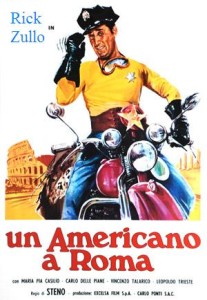“The thing about the rat race is that even if you win, you’re still a rat.”
We’ve all entertained the fantasy at one time or another: tell the boss to “vaffanculo,” pack two suitcases and head to the airport with no reservations and only the faintest notion of a plan. The Great Escape, we could call it, and the destination is almost beside the point. Half a day later we’d arrive on the other side of the world where we’d forget all of our troubles and start over with the proverbial clean slate. Appealing, isn’t it?

Yes, it is, and as one who has actually done it, I can verify that those first days/weeks/months are just as sweet as you can imagine. So now you’re ready for me to tell you the bad news. Except that there really isn’t any bad news; rather just a slow realization that, “no matter where you go, there you are.” If you weren’t happy back home, then ultimately you won’t be happy anywhere else, either. However if you already have your head on straight, then being an expat presents some really unique opportunities for adventure and self-discovery.
To make this metamorphosis complete, ideally you should choose a destination where you don’t speak the local language, or at least not fluently. This is the true reset: you’ve become a child again, seeing the world for the first time. You are forced to approach the world more deliberately. You must attend to your primary needs and cerebral thoughts (or worries) are not even an option.
Beyond the language, you must also learn social protocols, which can be even more elusive. Then there are the practicalities of daily life—shopping, banking, using public transportation, etc. At first, you’re surprised that these things aren’t more universal and in line with what you’ve always known. After you’ve discovered that they aren’t then you start to question why “they” can’t just do things the “normal” way (i.e. the “better” way) like they do back home? But if you stay long enough, the third evolution of this thought process turns the question around: why can’t “we” occasionally do things like “them?” Now you’re starting to really appreciate this new life and your mind opens up to all sorts of possibilities. The notion of an absolute truth begins to fade away.
Of course, this all assumes that you’ve actually entered into the local culture and not sequestered yourself inside an expat-only community or five-star accommodations where the English language and American-style comforts cloister you from the very environment that you’ve come to experience. This would be a huge mistake and the missed chance of a lifetime.
Get a real apartment in a real neighborhood and not in Piazza Navona or on the Via Veneto—even if you can afford it. Get a job, if you can. Learn to speak Italian, obviously. Don’t be afraid to get lost, to get dirty, or to embarrass yourself over and over again. In fact, you should heartily embrace this attitude and seek out situations where the opportunity for a colossal public blunder is almost guaranteed.
This is how you gain real knowledge; not by reading or observing or studying, but by living and doing. At some point over the last 25 years we began to mistake information for knowledge—they are not the same thing. You’ve got all the information about Italy that you need right there on your computer via the Internet. But that’s not going to help you drive a car through Rome during rush hour. You’re going to have to get dirty. (And learn a few helpful hand gestures, too!)
The Joys of the Expat Experience
There are some huge advantages to being an expat. First, “their” social problems are not your social problems, so you are free to enjoy the good things about their culture and leave the distasteful things for “them” to deal with. Furthermore, the problems of your own native country are now distant, and so those concerns no longer affect you either. It’s sort of a social limbo that exempts you from taking a side in most debates. You can just shrug and claim ignorance (which is usually not that big of a leap). This can seem like a great relief after 30, 40, or 50 years of giving a shit.

Then there is your new role as “lo straniero,” the foreigner. Not that an American in Rome is exactly a novelty, but still, you are always viewed as something out of the ordinary. You’re suddenly special and the only thing that you’ve done to deserve this special status is that you’ve come from someplace else. I’ve even had the experience of being the first American that a person had ever met. I was grocery shopping one day at a small market in a suburb of Rome. When I was checking out, the young clerk noted my obvious foreign accent and she asked me, “Ma, è inglese, Lei?” (But you are English, sir?)
“No, sono Americano.”
“Figo!” (Cool!)
As for the Italians in general, well, as a whole they’ve been extremely tolerant of me and my ignorance. Beyond tolerant, actually, they’ve been nothing but welcoming and gracious and have often gone out of their way to help me adapt. I don’t have the heart to tell them that I don’t really want to adapt. I like the feeling of always being slightly disoriented, of feeling out of place—it keeps me mindful and in the moment. I like focusing on the little things. I want to remain in that blissful purgatory where I only have to worry if my pasta is al dente, and not about the unemployment rate or the corrupt politics or the immigration problem. An expat can choose this selective existence—at least for a while.
It’s a general rule that expats everywhere appreciate their new home more than the locals who’ve always lived there. Every day I’m struck by the miracles of human achievement that surround me here in Rome. Yet, I can’t tell you how many Italians have said to me, “I want to leave Italy for a while so that I can come back as a tourist.” This makes sense, I think—we all tend to take our surroundings for granted. It’s nearly inconceivable to me that historical marvels such as the Coliseum, the Forums, and the Pantheon could ever be taken for granted. But then again I didn’t grow up in Rome, so it’s difficult to imagine this perspective.
Tu vuo’ fa l’italiano?
I wonder what the statistics are concerning American expats in Italy? And I don’t mean those who are here on work assignment or military service or something like that. I’m more curious about those who “fell in love with Italy” by watching a movie or seeing an opera or something like that and then came here to find La Dolce Vita. How many stay and how many go back home two months later disillusioned? Certainly this second group is the majority. Life here can be very hard at times and not always so “bella.” Believe me, you can find some truly horrible food/restaurants in Rome. There is a constant battle to keep the graffiti off the monuments and the trash out of the streets. And no, not everybody is charmed to make your acquaintance, Signor Americano.
Many people don’t really want to face this gritty reality. They want to maintain their Hollywood version of Italy and they seem to resent Italy and the Italians for not delivering it to them. That’s too bad, because if you stick around long enough you can still discover that same magical sentiment, if not the exact same cast and scenery. Italy is a real place, not a gift-wrapped backdrop to our fantasies.
But I can assure you that it is a country full of both miracles and tragedies—and for me, that is its appeal. There is no room for anything generic. You are constantly exposed to the full range of emotions. After a few months, you will have some very strong opinions about this place—they will either be adoring or despising and nowhere near the middle of the road. You must engage and participate—Italy will not allow a true expat to simply go along for the ride. Why would you want to, anyway?
“Two roads diverged in a wood…”
Rome is certainly not the road less traveled. Even before the advent of mass tourism, millions of travelers had passed through the city gates. However, what is less traveled is the true expat road—the one where you step out of your comfort zone and expose yourself to real life. But be warned; it changes you. You’ll see some things that you would have rather not seen and maybe learn some things about yourself that you would have rather not known. But you’ll be better off for it in the end.
So pick a destination: if not Rome, then somewhere else in Italy. If not in Italy, then somewhere else in the world. It’s not about the place, it’s about you. The key idea is to remove yourself from familiar habits in order to break that dull hypnotic trance. Open your eyes and have a look around. Being an expat—whether for six months or ten years—can (and should) be the best experience of your adult life. Now pack a bag and start planning what you’re going to say to your boss.

I’m very happy to have found this blog, beautiful writing and …well as an Italian I thank you from the bottom of my heart for your words and insight about my country, not many are as broad minded and ready to accept differences as you seem to be. Thank you,
Lucia
You’re welcome, Lucia, and thanks for your kind words, Yes, I know that I make mistakes sometimes, but I try to at least keep an open mind so that I keep learning and increasing my knowledge. The fun part is in the discovery!
Thanks again for your most positive and balanced insight, Rick. It was much a much needed reminder!
Ciao Cassidy! Grazie!
Hi, Rick. I am an Italian in the US. I like it and I am adapting. Which is great for me… I am a translator (En>It) and for doing that I need to learn as many aspects as possible of US culture. And at the same time trying not to forget my own culture! Anyway, as an Italian I’m glad that you’re having a very good experience in Italy but you should thank, at least in part, your citizenship! Yes, being an American you’ll be generally welcomed by Italians. In Italians mind, in fact, America means: money, adventure, NY, LA, big cars, and tourists! As a “homework” I suggest you to pay attention to the reaction of Italians towards other immigrants; maybe those that are not associated, in Italians minds, w/money, and tourism. Finally, again, I liked reading your blog and I am happy you found In Italy what you were looking for.
Hi Manuela! Yes, I realize that you’re right, of course. Americans enjoy much better treatment than most other immigrants–in fact, I emphasized that point in my e-book. Although I’d still argue that immigrants in Italy are overall treated better than immigrants in the US. Yes, I suppose that I’ve found in Italy what I was looking for. And I hope that you’ve done the same in the US! Ciao and thanks for your comments!
Hi Rick, I loved reading this piece – we have been here 2 years now, and I can relate to every word! Italy is like a beautiful woman – utterly beguiling, completely exasperating at times and yet all you want to do is be with her. Italy is never predictable, she has a habit of taking your breath away when you least expect her and you forgive her all her foibles in a nano second! I love the place, warts and all!
Hi Renee and shame on you for doing a better job of explaining Italy than me! ha, ha Seriously, your words are well chosen and the metaphor fits perfectly. I, too, love her, warts and all. She challenges you, but rewards you richly if you meet the challenge.
Thanks for your great comment! Ciao!
Rick,
I love everything you write. I’ve probably told you, but I’m planning my “escape” now, I’m leaving in September and plan on moving to Rome for several months, among other places and have spent much time contemplating my motivations. I think true expat/travelers are all like-minded. We want to see and experience the world without becoming so wrapped up in it’s politics that we miss the true beauty.
Everything you’ve written about has answered at least one question I’ve been mulling around in my mind. Your articles are always well-written, uber insightful, ridiculously helpful and have a great touch of humanity.
Thanks!!
Thanks Christy, you’re too kind. But I can tell that you have the perfect mindset to fully appreciate the amazing experience that you’re about to have. September will be here before you know it! Keep me posted on your preparations and please don’t hesitate to write if you have any specific questions regarding Rome/Italy. Ciao!
I’ve always appreciated your “expat” point of view. Because it’s open minded and humble. I’ve met so many tourists/expats spoiling their experience because they were too busy bitching about all the things that they thought weren’t handled “properly” (read: their way). Letting go of absolutes is a fundamental step for personal growth, even more necessary if that growth is being expanded through travels. It’ll be a bless discovering and learning from scratch; it’d be a curse of frustration and disappointment to insist into wanting things to be a certain way. Bravo!
P.S. There’s so much to love about you.
Thanks Jessica! Yes, being open minded is essential to gaining from the expat experience. If you insist on maintaining your same thoughts/ideas/opinions, then you might as well stay home and watch a movie about Italy–at least then you can fast-forward through the parts you don’t like.
P.S. Ma quanto TI amo!?!